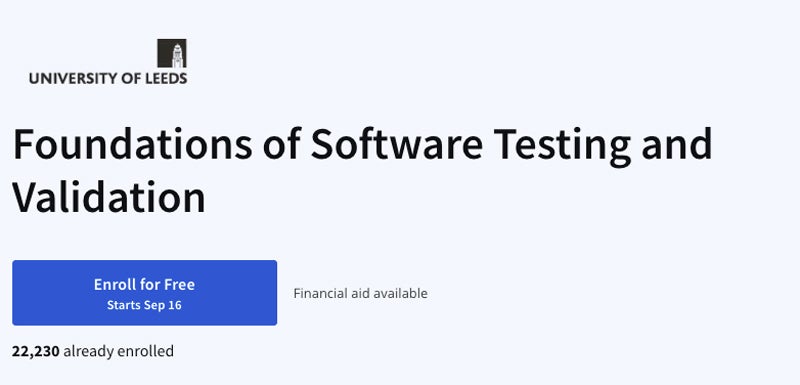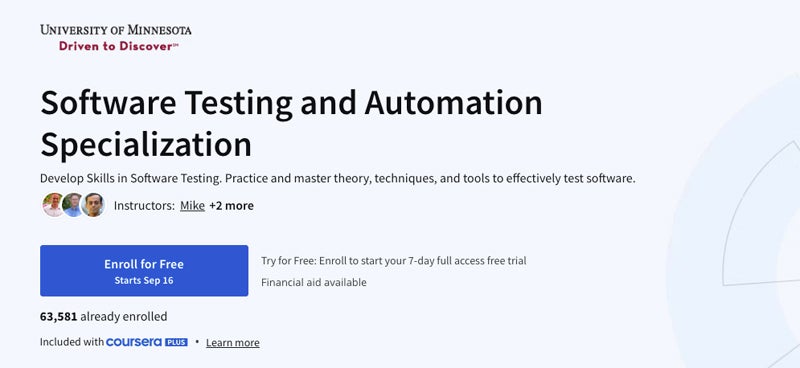The Top Software Testing Courses to Consider in 2024
Software testing is a critical aspect for businesses with a digital presence. It helps in finding bugs, security vulnerabilities, and performance issues before software is released to the public, ensuring smooth application functionality and protecting a company’s reputation.
While development teams focus on building new features, dedicated software testers, also known as quality assurance analysts, play a vital role in testing applications. They conduct manual and automated tests to identify bugs, test security measures, and ensure software functionality across various environments and scenarios.
According to the U.S. Bureau of Labor Statistics, the demand for software developers, QA analysts, and testers is expected to grow by 17% between 2023 and 2033, faster than the average for all occupations. Despite this growth, only 16% of businesses believe their testing practices are efficient, and the rise of AI applications is exacerbating the challenge.
The good news is that you don’t need to be an expert coder to start a career in software testing. Beginners can learn the basics and enter the field, while professional developers can enhance their skills to catch issues in their own code before deployment.
If you’re interested in venturing into software testing or aim to expand your skills as a developer, consider enrolling in an online course. Here, we present the top six software testing courses available in 2024 that cater to learners with varying levels of experience, goals, and budgets.
Best software testing courses: Comparison table
Foundations of Software Testing and Validation – Coursera: Best for beginners (overview)

“Foundations of Software Testing and Validation” offered by the University of Leeds provides a brief overview of the field. It covers software testing types, test cases, bugs, and static code analysis. Ideal for beginners, this course helps learners check their understanding of the subject matter and decide if they want to delve deeper into the field.
Price
$59/£38
Duration
Five hours
Pre-requisites
None
Skills taught
Software testing concepts, Software Development Life Cycle, dynamic testing, test analysis.
Pros and cons
| Pros | Cons |
|
|
The Complete 2024 Software Testing Bootcamp – Udemy: Best for beginners (in-depth)

The Complete 2024 Software Testing Bootcamp on Udemy is designed for individuals who wish to start a career in quality assurance. It covers software testing fundamentals, test case writing and execution, API testing, performance testing, and automation. Learners also receive guidance on creating a CV and freelancing opportunities. The course is frequently updated and often discounted.
Price
$124.99/£59.99
Duration
33.5 hours
Pre-requisites
None
Skills taught
Software testing concepts, black-box test techniques, white-box test techniques, Agile testing, report writing.
Pros and cons
| Pros | Cons |
|
|
Software Testing and Automation Specialization – Coursera: Best for developers

“Software Testing and Automation Specialization” by the University of Minnesota is tailored for early-career software developers seeking comprehensive software testing education. It covers writing functional tests for front-end and back-end code, test automation, and app testing. By the end of the course, learners will be proficient in developing tests that meet industry standards.
Price
$59/£30 a month after a seven-day free trial
Duration
80 hours
Pre-requisites
Experience with an object-oriented programming language
Skills taught
Unit testing, testing automation, static analysis, white-box testing techniques, integration testing.
Pros and cons
| Pros | Cons |
|
|
Automated Testing – End to End – Pluralsight: Best for automating testing

For developers looking to automate software testing processes, “Automated Testing – End to End” on Pluralsight is ideal. This course emphasizes the use of tools and scripting to automate tests and ensure quicker defect detection. The course by Jason Roberts covers unit, integration, and functional UI testing, along with continuous integration with TeamCity server.
Price
$29/£24 a month after a ten-day free trial
Duration
Three hours
Pre-requisites
No specific pre-requisites, but intended for software developers
Skills taught
Automated testing principles, integration testing, UI testing, unit testing, TeamCity integration.
Pros and cons
| Pros | Cons |
|
Rest API Testing (Automation) from Scratch-Rest Assured Java – Udemy: Best for API testing

“Rest API Testing (Automation) from Scratch-Rest Assured Java” on Udemy teaches learners how to automate API testing within the REST architecture, assuming no prior programming knowledge. The course covers setting up a testing framework with Java, TestNG, and Maven, integrating with Jenkins, and practical API testing exercises. Advanced topics like OAuth 2.0 and serialization are also included.
Price
$149.99/£59.99
Duration
24.5 hours
Pre-requisites
None
Skills taught
API automation, JIRA APIs, Google APIs, serialization, deserialization, Jenkins integration.
Pros and cons
| Pros | Cons |
|
|
ISTQB Foundation Level (CTFL) V4.0 updated 2024 – Udemy: Best for certification

The “ISTQB Foundation Level (CTFL) V4.0 updated 2024” course on Udemy aims to prepare individuals for the ISTQB Foundation Level exam. It covers the latest syllabus topics, including software testing fundamentals, test design techniques, and test management practices. While the course does not provide certification, it helps in exam preparation for the ISTQB certification through accredited providers.
Price
$129.99/£79.99
Duration
Eight hours
Pre-requisites
Basic understanding of software lifecycle and programming
Skills taught
Software testing fundamentals, Software Development Life Cycle (SDLC), test analysis, management, and tools.
Pros and cons
| Pros | Cons |
|
|
What are the differences between manual and automated software testing courses?
Manual testing courses focus on learning manual test case execution without using tools and are suitable for beginners. Automated testing courses, like Pluralsight’s “Automated Testing: End to End,” emphasize using tools and scripts to automate tests for quicker defect detection, making them ideal for developers looking to automate testing in their workflows.
In manual testing, learners might verify an online shopping cart’s functionality by checking item addition and price updates manually. In automated testing, they may write scripts to automate these tests across various platforms.
What career opportunities can you pursue with a certificate in software testing?
A certificate in software testing opens up various career paths, including roles like software test engineer, quality assurance analyst, performance tester, and project manager. Each role offers different responsibilities and opportunities, catering to diverse skill sets and interests.
What are the two main types of methodologies of software testing?
Software testing methodologies encompass various approaches to assess software functionality and quality. The two main methodologies are unit testing, focused on testing individual components independently, and integration testing, which validates component interaction after integration. Each methodology plays a crucial role in ensuring software quality and performance.
Methodology
During our evaluation of online courses, we considered factors like provider credibility, course depth, practicality, cost-effectiveness, and duration. The courses reviewed offer a wide range of content and flexibility to cater to different learning preferences and goals.


